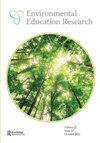What people learn from death: exploring citizen scientists’ learning outcomes in Taiwan Roadkill Observation Network from an environmental education perspective
IF 3.1
3区 教育学
Q1 EDUCATION & EDUCATIONAL RESEARCH
引用次数: 3
Abstract
Abstract Citizen science is a key approach in scientific research that involves crowdsourced data collection for environmental monitoring and conservation. Participants in citizen science can gain scientific knowledge, change their pro-environmental attitude and behavior. Taiwan Roadkill Observation Network (TaiRON) was founded in 2011 and has a community of approximately 20,000 members. To collect data for further biological research, participants adopt a simple approach: taking pictures of roadkill and uploading them to a database. While many studies have explored citizen science learning outcomes, this study examines how a program with a unique participant task – photographing road kill – has an impact on participants pro-environmental learning. The learning outcome with the largest change was environmental attitude, suggesting that the participants’ feelings, awareness, and values regarding the environment changed after joining TaiRON. The reasons for the attitude changes could be attributed to the characteristics of TaiRON’s work: participants collect data from animal carcasses, prompting them to reflect deeply on the value of life. The second key learning outcome was behavioural intention, which means participants were driven to action to mitigate roadkill occurrence. Our results provide an example of evaluating learning outcomes in citizen science and also contribute to promoting environmental literacy.人从死亡中学到什么:从环境教育的角度探讨台湾路杀动物观察网公民科学家的学习成果
摘要:公民科学是环境监测和保护的众包数据收集科学研究的重要途径。公民科学的参与者可以获得科学知识,改变他们亲环境的态度和行为。台湾路杀动物观察网(TaiRON)成立于2011年,拥有约20,000名成员。为了进一步的生物学研究收集数据,参与者采用了一种简单的方法:给被公路撞死的动物拍照并上传到数据库。虽然许多研究都探讨了公民科学学习的结果,但本研究考察了一个具有独特参与者任务的项目-拍摄道路上的死亡-如何对参与者的环保学习产生影响。学习成果中变化最大的是环境态度,表明参与者在加入泰隆后对环境的感受、意识和价值观发生了变化。这种态度转变的原因可以归结为泰隆的工作特点:参与者从动物尸体中收集数据,促使他们深刻反思生命的价值。第二个关键的学习成果是行为意愿,这意味着参与者被驱使采取行动,以减少道路死亡事件的发生。我们的研究结果提供了一个评估公民科学学习成果的例子,也有助于提高环境素养。
本文章由计算机程序翻译,如有差异,请以英文原文为准。
求助全文
约1分钟内获得全文
求助全文

 求助内容:
求助内容: 应助结果提醒方式:
应助结果提醒方式:


